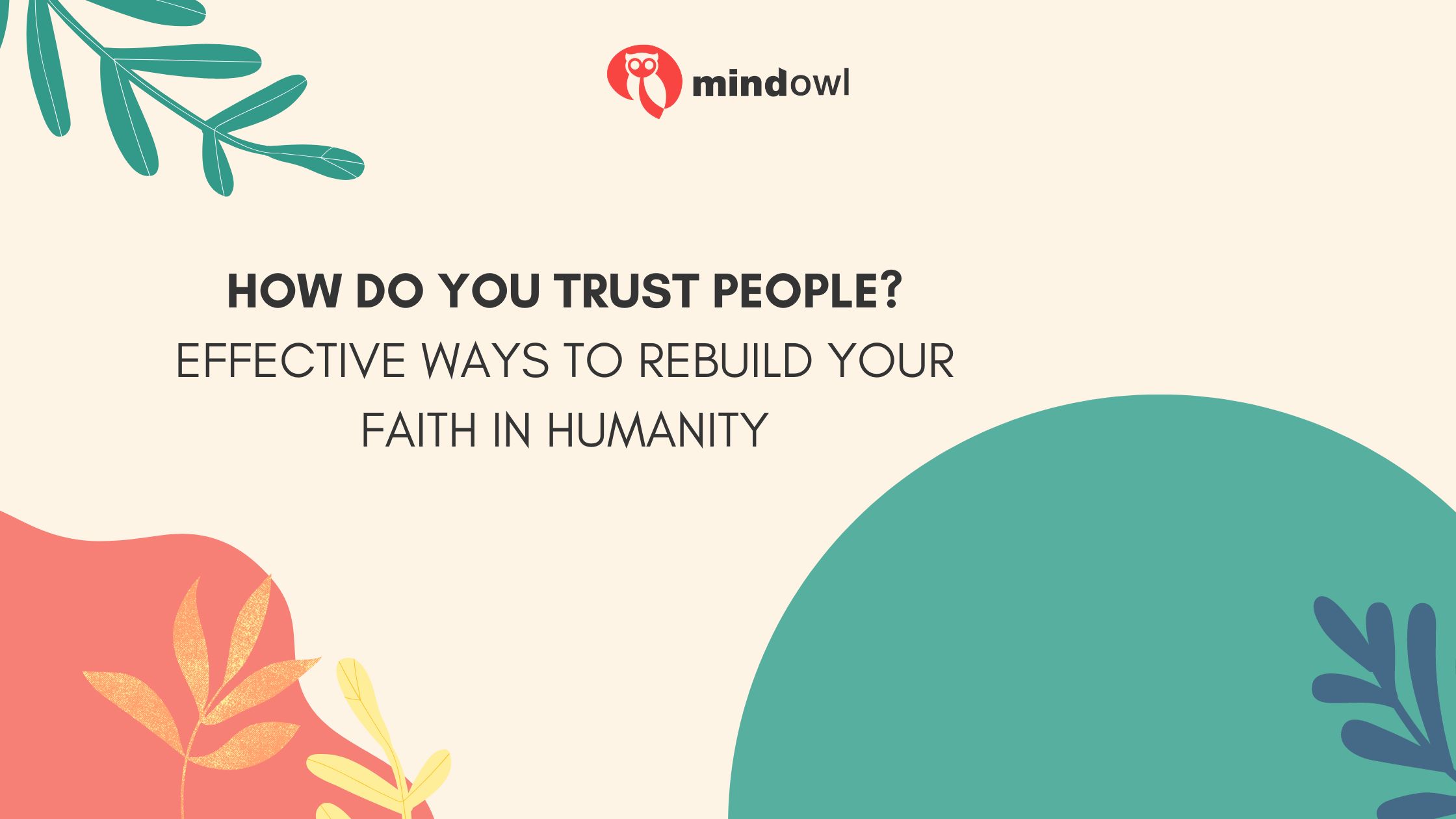
Trusting people can be tough, especially if you’ve been let down before. Studies show that experiences of betrayal can have a long-lasting impact on our ability to trust. This article offers seven practical ways to heal and restore your faith in the goodness of others.
Rebuilding trust might just be closer than you think – keep reading to find out how!
Key Takeaways
- Healing past hurts is important for trusting again. Talk about your feelings, write them down, and maybe forgive the person who hurt you.
- Trust yourself first. Do things that make you happy and spend time thinking about what makes you strong.
- When talking to others, tell them what you expect and set clear boundaries. This helps build trust because everyone knows where they stand.
- If something or someone makes you feel distrustful, try to understand why. Sometimes talking with a therapist can help sort this out.
- Believe in the good actions of people around you. Notice when someone does something nice or honest – it can help change how you see the world.
Understanding the Root Causes of Distrust

Past relationship wounds, cultural influences, and childhood trauma are underlying factors that contribute to the development of distrust in people. It is essential to understand these root causes in order to effectively address and rebuild faith in humanity.
Past relationship wounds
Getting hurt by someone we trust can leave a deep mark. It might happen in love, with friends, or even with family members. For example, if a partner has been unfaithful, it can make it very hard for us to trust anyone again.
This pain from the past affects how we see new people in our life.
We carry these wounds around like heavy bags that slow us down. They make us scared to let someone get close because we don’t want to feel that hurt again. Even when people seem nice and trustworthy, those old fears jump up and stop us from giving them a chance.
Cultural influences
Different cultures have their own ideas about trust. These can shape how we see other people and whether we think they are good or not. In some places, people believe that you should only trust your family or close friends.
Others might feel that everyone deserves to be trusted until they prove otherwise.
From when we are young, these cultural lessons can stick with us and affect our ability to trust others as adults. What if you grew up in an area where there was a lot of betrayal? You might find it hard to let new people into your life because your culture has taught you to be careful.
To learn to trust more, sometimes you need to look at these old beliefs and decide if they help or limit you now.
Childhood trauma
After looking at how culture shapes our trust, it’s crucial to address the deep impact of childhood trauma. This kind of pain isn’t just a bad memory—it can twist how we see others and make us fear getting close.
Kids who go through hard times like abuse often find it tough to believe people later on. They might feel scared, mixed up, and nervous around others.
Therapy can help heal these old hurts so someone can learn to let safe people into their life again. Trust takes work when your young years have been filled with harm. But facing these challenges is a big step in building honest ties with folks we meet as adults.
Breaking the Cycle of Distrust

Heal your past wounds by addressing unresolved issues and seeking closure. Challenge cultural norms by questioning societal beliefs that contribute to your distrust, and seek therapy to work through any childhood trauma that may be impacting your ability to trust others.
Heal your past wounds
Carrying old hurts can make it hard to trust. Healing these wounds opens the door to new connections and trust.
- Accept that you’ve been hurt. It’s okay to acknowledge your pain without letting it control you.
- Talk about your feelings with friends or family who care for you. A listening ear can be comforting.
- Write down what happened and how it made you feel. This helps to get your thoughts and emotions out.
- Forgive the person who broke your trust. This doesn’t mean you have to be friends, but forgiving can help you let go of the pain.
- Give yourself time. Wounds don’t heal overnight, so be patient with yourself as you work through your feelings.
- Celebrate small steps in healing. Each bit of progress is a move towards trusting others again.
- Look at the situation from a different view. Try to see things from the other person’s side, which might help you understand why they did what they did.
- Find things that make you happy and do them often. Joyful activities can improve your mood and help mend emotional wounds.
Challenge cultural norms
Cultural norms can make us think that not trusting is normal. To heal, we must question these old rules. Engage in community work to fix social trust and show kindness to others. Small brave acts can inspire change and rebuild belief in people.
Stories of courage or helping without wanting anything back also break cultural patterns. They push us to see the world through new eyes, where trust begins with thinking good about others.
Stand up for what you believe in and take steps toward a society built on mutual respect and understanding.
Seek therapy for childhood trauma
Childhood trauma can break trust and make it tough to feel safe with others. Seeing a therapist is a strong step towards healing. They have special training to help people who are hurt as kids learn to trust again.
Therapy provides tools and ways to care for yourself that can shift how you connect with people in your life.
Therapists understand that past pain can change the way you see the world. Through therapy, they work on reducing stress from old trauma and help build new, healthy beliefs about trusting others.
This could mean talking through fears or learning exercises that make you stronger inside. It’s important because being able to trust is part of having good relationships and feeling happy again.
The Importance of Trusting Yourself
Prioritise self-care and take time for self-reflection to strengthen your own trust in yourself. To learn more about building trust with others and overcoming triggered distrust, continue reading the full article.
Prioritise self-care
Taking care of yourself is key to feeling confident. When you feel good about who you are, other people can trust you more easily. This means doing things that make you happy and relaxed.
Be kind to yourself, like a friend would be. Make time for things you enjoy and give your body the rest it needs.
Learning how to trust starts with trusting yourself first. Spend some quiet moments thinking about your life. What makes you strong? What dreams do you have? Use these times to build a strong sense of who you are.
When your heart is sure of itself, letting others in becomes easier too.
Take time for self-reflection
To build trust in others, it is important to start by trusting yourself. Taking time for self-reflection can help you understand your own feelings and beliefs. This allows you to identify any patterns of behavior or thought that may be affecting your ability to trust others.
Self-compassion and quality time for yourself are crucial in learning how to trust yourself, as they increase confidence and ease decision-making. By prioritising self-care and setting aside moments for introspection, you can develop a stronger sense of self-trust, which serves as the foundation for building trust with others.
Additionally, taking the time to reflect on past experiences that have led to distrust can provide valuable insights into your triggers and fears. Understanding the root causes of your lack of trust is an essential step towards breaking free from its hold over your relationships.
Building Trust with Others
Communicate your expectations clearly, set boundaries and allow time for trust to develop. To discover more effective ways to rebuild your faith in humanity, keep reading.
Communicate your expectations
Expressing your needs and desires clearly is crucial in fostering trust with others. Clearly stating what you expect from a relationship or interaction sets a foundation for mutual understanding.
Open communication, aligned with honesty and sincerity, builds an environment where trust can flourish. It’s important to remember that consistent communication of expectations helps establish boundaries and encourages respect within relationships.
Setting clear boundaries also plays a significant role in building and maintaining trust. Communicating openly about personal limits allows for a respectful exchange of needs between individuals.
Acknowledging each other’s boundaries fosters an environment of safety and mutual understanding, nurturing the growth of trust within the relationship.
Set clear boundaries
Setting clear boundaries is essential in any relationship. When you communicate your expectations and limits, it helps others understand how to treat you. This is an important step in building trust and creating a healthy dynamic with those around you.
Profoundly, professional boundaries are crucial in fields like social work and social care to uphold trustworthiness with clients, emphasising the significance of boundary setting as a foundation for trust.
In everyday interactions, expressing your boundaries can also prevent misunderstandings and conflicts. It establishes mutual respect and understanding between individuals while paving the way for a more secure and trustworthy connection.
Allow time for trust to develop
Trust cannot be rushed. It takes time to grow and develop. Consistency in actions, honesty, and reliability are crucial for trust to build. In fact, trust often results from consistency and being there for others consistently through good times and bad.
This means that giving time for trust to develop is essential in any relationship, whether it’s with a friend, family member, or colleague at work.
It’s important to remember that rebuilding trust within organisations also requires awareness of essential behaviours over time. Trust can be built by acting with integrity, attracting other quality individuals, and displaying character, honesty, and a generous attitude.
Overcoming Triggered Distrust
Identify and address your triggers to overcome distrustful feelings, seek professional therapy if needed, and focus on the actions of others rather than assumptions. This will help you to navigate through triggering situations and build a more trusting mindset.
Identify and address your triggers
Recognising and understanding your triggers is a crucial first step in managing emotional responses. Triggers can be likened to emotional Band-Aids, covering up unhealed trauma. It’s important to identify and address them instead of denying or suppressing through self-medication.
By acknowledging and dealing with these triggers, you can effectively manage your emotional reactions and work towards rebuilding trust in yourself and others.
Denying, blaming others, or making excuses are common responses to triggers, but it’s vital to confront them head-on. Identifying these triggers allows for the opportunity to heal past wounds and move forward with healthier ways of relating to yourself and those around you.
Seek professional therapy
Seeking professional therapy is crucial for overcoming triggered distrust and learning how to trust people again. Talk therapy, in particular, is recommended as one of the best ways to address trust issues and help individuals identify the sources of mistrust.
Trust issues can significantly burden an individual both mentally and physically, leading to overwhelming anxiety and feelings of vulnerability. Receiving reassurance when triggered by past experiences of distrust can help individuals in rebuilding their faith in humanity.
Additionally, trauma-informed care in behavioral health services can play a significant role in addressing trust issues and supporting individuals in overcoming distrust. This approach takes into account the impact of traumatic experiences on an individual’s ability to trust others, providing tailored support that acknowledges these unique challenges.
Focus on the actions of others
After seeking professional therapy, focusing on the actions of others is an essential step in rebuilding trust. Be open to observing and acknowledging the consistent behaviours of people around you.
Allow yourself to recognise and appreciate small acts of kindness and integrity from others.
Taking note of these positive actions can help reshape your perception and gradually rebuild faith in humanity. It’s important to give people the opportunity to demonstrate their trustworthiness through their conduct.
Moving Forward and Starting Fresh
Commit to a fresh start by letting go of past hurts and focusing on self-growth. Practise forgiveness, both for yourself and others, as you move forward with a renewed sense of trust in humanity.
Commit to a fresh start
Start by making a conscious decision to let go of past hurts and disappointments. Embrace the idea that every new interaction is an opportunity for positive experiences, despite previous negative encounters.
Challenge yourself to approach people with an open mind, giving them the benefit of the doubt until they demonstrate otherwise.
Remember that building trust takes time and effort from both sides. Be patient with yourself as well as others, acknowledging that it’s okay to take small steps towards trusting again rather than leaping into full trust immediately.
Practise forgiveness
Choosing to forgive is a decision you make, not just a feeling. It’s an important step in freeing yourself from resentment and anger. Forgiveness doesn’t always mean reconciling with the person who hurt you, but it can promote community building and heal relationships.
Research shows that forgiveness can benefit your mental health and well-being. Embracing forgiveness as a process rather than just an attitude allows you to take control of your own thoughts and emotions.
Practising forgiveness is like choosing to let go of someone or something that’s been holding onto you tightly. It’s about taking the first step towards freeing yourself from negative feelings.
Focus on self-growth
To focus on self-growth, start by prioritising self-care. Take time to reflect on your strengths and weaknesses, and make a conscious effort to build confidence in yourself. Coping strategies for traumatic events can aid in this process, helping you move forward and grow.
Additionally, forgiving yourself for past mistakes is crucial for rebuilding faith in humanity and starting fresh.
Believing in yourself is key to succeeding, as it leads to greater success in goal setting. Reflecting on your actions can help build trust and faith not only in yourself but also in others.
Conclusion
In conclusion, rebuilding trust in humanity requires self-reflection to heal past wounds and challenge cultural norms. Prioritising self-care and setting boundaries are crucial for trusting yourself and building trust with others.
Identifying triggers, seeking professional therapy, and focusing on the actions of others can help overcome triggered distrust. Moving forward involves commitment to a fresh start, practicing forgiveness, and focusing on self-growth.
These proactive steps pave the way for rebuilding faith in humanity and learning to trust people again.
FAQs
1. What does it mean to rebuild trust with someone?
To rebuild trust means learning to trust others again after someone has broken your trust, taking steps to believe people are mostly good and trustworthy.
2. Why do some people find it hard to trust others?
People may find it hard to trust because they have been hurt in the past or have a fear of getting hurt or upset again, which leads them to feel unable to get close or engage with others.
3. Can you really learn how to trust people again?
Yes, by understanding that most people mean well and starting with small steps like seeing what you get when you risk trusting another can help rebuild your faith in humanity.
4. What might stop someone from wanting to build relationships with others?
If a person feels unable to take the crucial leap of faith required for building trust in a relationship or fears betrayal, they might keep their distance from forming new ties.
5. How can moving around much affect someone’s ability to trust?
Moving frequently across the country or world can make building lasting relationships difficult due to lack of repetition—seeing the same faces—and this could lead one not see themselves as able accept trusting anyone fully.
6. What is one step I can take towards rebuilding my ability to trust?
You could start by trying something small like sharing a little about yourself; this first step reveals openness and willingness biscuit positive engagement leading toward more significant acts of faith.
MindOwl Founder – My own struggles in life have led me to this path of understanding the human condition. I graduated with a bachelor’s degree in philosophy before completing a master’s degree in psychology at Regent’s University London. I then completed a postgraduate diploma in philosophical counselling before being trained in ACT (Acceptance and commitment therapy).
I’ve spent the last eight years studying the encounter of meditative practices with modern psychology.


